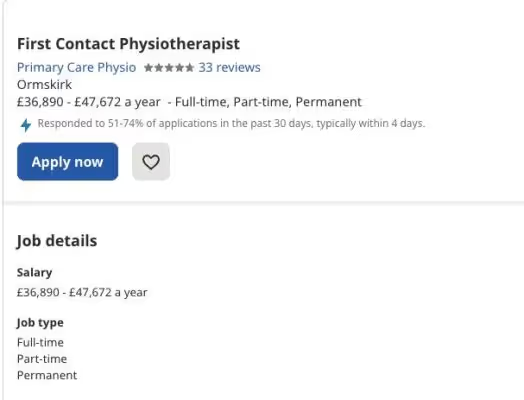Many UK physiotherapists are combining working in both the public and private sectors; they’re augmenting their ‘day job’ income, developing an area of interest in their own time, and even tendering as a private physiotherapy company for an NHS contract.
Some are also leaving the NHS altogether to pursue a career in either their own private practice or working for an already established one.
If you're thinking of going private, or setting up your own practice, but are nervous about what leaving the NHS might mean, read on.
This guide looks at the pros and cons of setting up your own private practice or working in an already established one, and what the main differences are when compared to the NHS.
TLDR? Check out the video here:
https://www.youtube.com/watch?v=yK6XB-xXqHs
Differences Between the NHS and Owning your own Private Physiotherapy Practice
Have you ever asked yourself: ‘How much could this client achieve if I could see them as often as I want?’ Well, in the private world, there are many more opportunities to prove that physiotherapy works.
It’s not to be taken lightly, though: for the physiotherapist used to being employed, running a practice is very different to working within a large organisation like the NHS.
Working independently can mean working alone without colleagues or a multidisciplinary team around you. This brings certain freedoms, but also responsibility as you take on aspects of practice previously provided by an employer.
You might also want to remember that professional bodies generally advise getting a few years of experience before going alone. But this doesn't necessarily mean that you can't, particularly if you have strong supervisory support.
All new graduates are expected to undertake a period in the NHS to consolidate their learning across a range of specialities in a structured environment. This also can offer continual learning and clinical supervision by experienced physiotherapists, depending on the NHS trust you’re working for.
We’ll look at the pros and cons of setting up your own practice shortly, but first, let’s take a look at the main differences between the NHS and private practice:
Opportunities
As a new graduate, you would traditionally take up a rotational position as a junior physiotherapist in the NHS. You’re then rotated into a new team roughly every six months in each trust. A typical rotation would be in musculoskeletal, rehabilitation, medicine, critical care, neurology, orthopaedics and community.
Unfortunately, with the financial pressures that many NHS trusts face, fewer jobs and rotations are available. As a result, rotations may now include only musculoskeletal and community rotations or only inpatient rotations.
Physiotherapists are now finding that opening up their practice can positively impact their professional development.
Continuing Professional Development (CPD)
Continuing professional development, or CPD, is the process of training and developing a therapist's skills throughout their career.
As a private practice owner, you have control over your CPD sessions and can potentially diversify your skills to gain a wide range of experience more quickly. This is especially valuable if you're planning to specialize in areas such as post-operative rehabilitation, sports injuries, or private hip replacement procedures.
Rates of Pay
Band 5 physiotherapists in the NHS start at £12.74/hr, around £27,055 pa. A Band 7 team leader starts at £19.89/hr, around £41,659 pa (2022/23 rates of pay).
If you own your practice, you can, of course, set your rate to whatever you’d like it to be. But that comes with a caveat: your rate will be dictated by what the insurance companies will pay you per session, and you also need to factor in your overheads, sick and holiday pay, and insurance, to name but a few.
Bear in mind that if a client doesn’t turn up, you won’t get paid.
Sick Pay
In the NHS, junior physiotherapists receive one month's full pay and two months' half pay. Annually, this increases to a maximum of 6 months of full pay and 6 months of half pay (NHS Handbook).
If you own your practice, you should factor in a percentage set aside for sickness out of your hourly wage. There is also the option to take out private income protection insurance policies - but obviously, this will increase your overheads.
Job Satisfaction
The number of NHS physiotherapists who feel they cannot offer patients the best treatment is rising. Liz Cowan, a physio who went from NHS into private practice in 2016, enjoys “the opportunity to see clients as often as I think they should be seen, based on clinical need, not waiting list pressures. Where clients may have had their input reduced under the NHS, I can keep providing input.”
Physiotherapists working in their own practice can use whatever treatments and modalities they deem most effective for their patients. By doing so, you can work within your scope of practice and do everything you can to benefit the patient.
Pros and Cons of Owning a Private Physiotherapist Clinic
When considering establishing a private practice, several factors like finances, equipment and marketing should be considered, which we’ll look at later on.
But first, let's go over a few of the pros and cons of flying solo:
Pros
Cons
Personal fulfilment: starting up and growing your own practice will give you a huge sense of achievement and getting paid for doing something you love makes it all the more rewardingIndependence: whilst owning your practice can be incredibly freeing, being the boss can sometimes be a lonely place - the buck stops with you Flexibility: when you’re the boss, you make the rules. Your clients are your #1 priority, but this gives you the flexibility to enjoy a more positive work: life balanceWinning business: when you open your doors (unlike in the NHS), you’ll need to find ways to attract and retain clients Financial Independence: few physios go into the profession motivated by money alone but running your own practice will provide you with the opportunity to directly impact your earning abilityExternal Factors: you will find that other factors beyond your clinical excellence will be determinants of success ranging from your ability to market your practices to economic factors Positive Challenge: every day’s a school day when you’re running your own business, and invariably you’ll jump out bed with a spring in your step!Management: if you have ambitions to grow your practice, you will need to recruit other team members, which brings great rewards but can also bring an extra set of challenges
How to Set Up a Private Physiotherapist Practice
Any physiotherapist can accept private business from people referring themselves to you.
Referrals may come from other professionals such as a GP, consultant doctor, physiotherapist or another healthcare professional; a healthcare intermediary company, legal firm (medico-legal work), insurance company or private organisation or company on behalf of their employees.
But if you want to set up your own practice, first check out our comprehensive guide on doing just that:
How to start up and grow a successful private practice
We’ve pulled out a few of the most frequently asked questions for you here:
Business Planning
The ownership structure of a private practice should be carefully considered when setting it up. A practice can be owned by a sole proprietor, a partnership, or a limited company, and there are different tax and legal implications for each scenario.
It's important to get professional advice, develop a thorough business plan, and evaluate the risks before starting a physiotherapy business.
As well as determining whether starting a business is viable, your business plan should cover these things:
- How strong is the competition?
- How much can you charge?
- Who will buy your service?
- How can you market the business?
- How do you evaluate the service and provide evidence of good practice?
- What are the costs involved (i.e. both initial and operating costs)?
- Who would provide the facilities and equipment?
- Will you have sufficient public and professional liability insurance?
- What would happen in the event of illness?
Your business plan should also include how much you'll charge and how often you'll treat people.
Certain things to consider are:
- How much will you charge for each treatment?
- Who will pay you (the patient, company, or health insurance)?
- Will you offer discounts to patients that pay at the time of treatment?
- Will you offer discounts to new patients to encourage them to use your practice?
Location
The first step is to identify the area where your practice will be located. Will it be at your own home, or do you need to rent or buy practice space?
Proximity to a GP surgery, gyms, and health/leisure centres can help you build local networks. A health centre or gym may be a good place to rent space to lower overheads and establish referral networks.
How much space do you need?
Make a list of everything you need before you start looking. Remember, as space increases, costs increase, so be careful.
- What equipment do you need?
- Do you need a lot of rooms?
- What size should the clinical areas be?
- How much storage space is needed?
- Can disabled people access the premises?
- Would you prefer to do your administration at home or in the clinic?
- Is a staff room needed?
Viewing a property: things to consider
Is the rent/mortgage affordable for you? Regardless of how perfect the property is, your fixed costs will increase if it costs too much, which could hurt your financial viability.
- Do you have to pay a deposit?
- What’s the business rate?
- When will you be able to move in?
- What is the minimum rental period?
- Does rent get reviewed often, and is there a formula?
- Are there any extra service charges, or is the rent all-inclusive?
- What is the notice period for moving out?
- Who is responsible for building maintenance and insurance?
- Does the lease or rental agreement restrict the use of the property?
- Is there parking available for clients?
- What’s the street/car park lighting like?
- Is there a history of break-ins at the premises/neighbouring premises?
Disabled Access: The Disability Discrimination Act 1995 makes it unlawful for service providers to discriminate against disabled people and requires providers to make "reasonable adjustments" concerning the physical features of their premises to overcome physical barriers to access.
Equipment
A wide range of equipment is available depending on the manufacturers, suppliers, and equipment you need.
There is also the option of leasing equipment. Second-hand equipment ads often appear in physiotherapy magazines. You’ll also want to set up your practice management software to keep your patient information safe and GDPR compliant and minimise your admin so you can get on with treating your patients.
What’s your angle or selling point?
You might want to write these questions down and brainstorm the answers so that you can get a good idea of where to focus in the initial stages of your new business:
Are you going to offer general physiotherapy or will you be specialising in certain areas such as sports injuries or paediatrics?
Are you going to work with other therapists?
You may want to partner with podiatrists, massage therapists or occupational therapists to give your clients a broader service.
Are you going to sell any physiotherapy equipment?
You may want to sell some equipment that your patients would find beneficial, such as wheat packs, back rolls, ankle weights or swiss balls.
Are you going to offer strictly appointments which are clinic based, or will you be doing home visits or maybe a combination of the two?
Do you intend to hire anyone to help you or will you work alone?
Marketing your Physiotherapy Practice
97% of consumers search for local businesses (like yours) online.
A practice website is essential to provide basic information about your practice and contact information for the practice and its members.
You will also need to focus on networking and referrals from GPs, gyms, and health and leisure facilities.
When considering a physiotherapy private practice within the UK, the Chartered Society of Physiotherapy (CSP) has issued a Code of Professional Values and Behaviour that details their regulations for advertising practice.
Additionally, you should decide whether or not you will specialise in a particular field of physiotherapy before you begin marketing your practice. You can narrow down your potential audience and marketing sources by specialising so that your message gets to the right people.
Differences Between NHS and Working for a Private Physiotherapy Practice
The other way to get into private physiotherapy work is to be employed by an already-established private practice. The lure of this is usually the assumption that you will be paid more by working in private practice.
But working in private practice doesn't always mean you’ll be paid more than if you worked for the NHS.
Liz Cowan explains: “I thought private physiotherapists were much better paid, but my hourly pay is less than in the NHS. The practice charges a lot more, but this covers all the overheads that go with running a private practice, including marketing and promotion.”
By being a business within a business, you will gain some business acumen and get a taste of running your own practice. If you do your job well, and word gets around, you get more clients – more clients means more hours, which means more pay.
Depending on your contract, you may find that you don't get paid if you don’t see any clients. If they cancel because they are ill on the day, you also won’t get paid. Paid holiday and sick leave may also vary depending on your contract.
You can also become an associate physiotherapist, which usually applies to a self-employed chartered physiotherapist who contracts with one or more practice principals (private practice owners) to treat patients at their premises in return for an hourly pay rate or a set percentage of the treatment fee.
Working as an associate physiotherapist in an established practice can provide a good introduction to running a private practice.
Physiotherapist Salary Guide
The average salary for a Physiotherapist in the UK in 2022 is roughly between £37,000 and £42,000 a year.
It’s an educated guess at best, because most of the UK’s approximately 70,000 Physiotherapists work in the NHS, where pay is regulated, as opposed to in the private sector, where it isn’t. The majority of those are currently operating at Band 6 level.
A job ad for the NHS:

Source: Indeed, November 2022
A job ad for the equivalent skill level in private practice:

Source: Indeed, November 2022
The most qualified, consultant-level Physiotherapists who reach the highest bandings can expect to earn between £50,000 and £90,000 a year.
When looking at salaries, it’s important also to make a comparison of employed and self-employed terms and conditions that will affect your pay:
NHS employedEmployed in private practiceSelf-employed, private practiceNational salary scales with defined pay bandsPotential for variable and uncertain income, dependent on employment contractVariable and/or uncertain income, but not limitedNational insurance and income tax deducted from pay (PAYE scheme)National insurance and income tax likely to be deducted from paySubmit annual tax return. Solely responsible for tax and national insurancePension schemePension provided to eligible staff by employerAllocate and provide own pensionPaid holidayWill vary depending on contractual agreementUnpaid holiday. May need to also pay and arrange for a locumPaid sick leaveWill vary depending on contractual agreementUnpaid sick leave. Must arrange for cover for patientsNHS indemnity coverEmployer responsible for employee’s negligenceAccountable for own negligence
Companies in the private sector who employ Physiotherapists, such as sports clubs or gyms, may look to the NHS for salary information. Your earnings will generally be determined by your experience, qualifications, and negotiating ability.
When it comes to Physiotherapists opening their own practices, there is no hard and fast rule. Starting out, you may earn a relatively low income, but if you succeed, you might earn far more than you would in the NHS.
Let WriteUpp Help You Run Your Private Physio Practice
If you’re thinking about starting up your own practice, start on the right foot by using private practice software for Physiotherapists.
WriteUpp is great for sole physiotherapists and larger multi-location clinics. You can view information about your bookings, as well as your clients' appointment history and upcoming appointments. The software will automatically send SMS and email reminders to your clients so no one misses an appointment.
Having the ability to create and annotate note templates has saved physiotherapists hours and improved the quality of their note-taking. What's more: you can use our pre-built note templates to make this process even easier for you.
You can upload body images with the ability to annotate, add your own notes templates to use at every session, and use our library of specialised physio note templates whenever you need to.

Use Physitrack? Physitrack is scientifically proven to increase home exercise adherence and patient confidence, and you can use it seamlessly alongside WriteUpp:
- Prescribe exercise programs straight from WriteUpp
- Assigning the program in Physitrack will automatically save to your client's record
- Data integrity between your platforms
Plus: Get an exclusive discount with Physitrack if you are a WriteUpp user!
Practice management software will free up your “wasted time” so you can spend more time building your practice, attracting more clients and generating more income.
If you have any questions or just want to chat with us about what an integrated practice management solution could do for you and your new practice, just grab us for a live chat.
The button is just there in the bottom right corner of your screen.



Join over 50,000 clinicians that we've helped using WriteUpp
Start my free trial




.png)

.png)
.png)